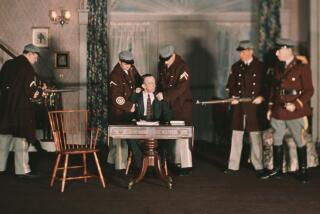Sir Karl Popper; Philosopher Denounced Totalitarianism
- Share via
LONDON — Sir Karl Popper, who as one of the 20th Century’s most respected philosophers railed against Marxism and dismissed Freud, has died in a south London hospital after a long illness. He was 92.
A proponent of individual liberty--rather than the impersonal forces of history--as a shaper of events, Popper had a profound impact on contemporary political thinking.
Peter Hintze, the general secretary of German Chancellor Helmut Kohl’s Christian Democrats, described Popper as a centrist. “His guiding philosophical steps were based on anti-totalitarianism, therefore posing a determined opposition to far-right extremists as well as communists,” Hintze said.
Costa Rican President Oscar Arias Sanchez, who won the Nobel Peace Prize in 1987 for his efforts to boost democracy as an alternative to guerrilla warfare, credited Popper’s work with solidifying his aversion to authoritarian regimes.
Specifically, Arias cited Popper’s best-known book, “The Open Society and Its Enemies.” Published in 1945, it critiqued the philosophies of thinkers from Plato to Marx for giving rise to totalitarianism.
“Only we, as human individuals, can do it,” he wrote. “Instead of posing as prophets we must become the makers of our fate.”
Popper also was known throughout his career for his writings on the scientific process. In 1957 he dismissed Freudian psychoanalysis, along with Marxism and astrology, as a self-confirming, non-scientific theory.
Popper was a professor of logic and science at the London School of Economics at the University of London for two decades beginning in 1949.
More to Read
Sign up for Essential California
The most important California stories and recommendations in your inbox every morning.
You may occasionally receive promotional content from the Los Angeles Times.












